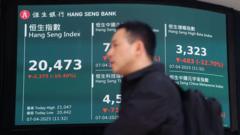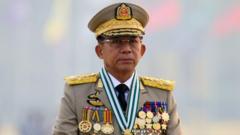In a significant political maneuver, Bangladesh's interim government has enacted a ban on the Awami League, a party associated with ousted leader Sheikh Hasina, amidst ongoing legal proceedings and student-led protests demanding accountability for past actions.**
Bangladesh's Interim Government Bans Awami League Amid Political Uproar**

Bangladesh's Interim Government Bans Awami League Amid Political Uproar**
The Awami League party, once led by ousted leader Sheikh Hasina, faces a ban from all activities as tensions rise following widespread protests and accusations of historical abuses.**
The interim government of Bangladesh has officially banned all activities of the Awami League, the political party previously led by Sheikh Hasina, who fled the country after a massive public uprising last summer. This prohibition was enacted under the antiterrorism act and will remain in place until multiple legal cases against the party and its leadership are resolved. Nobel laureate Muhammad Yunus heads this interim government.
Widespread protests erupted when supporters of the Awami League were accused of attacking prominent student leader Hasnat Abdullah, who played a key role in last year’s protests. The public's outcry for stricter measures against the Awami League grew, leading to rallies where many demand the party's ultimate dissolution. Protestor Hasnat declared, “Our ultimate goal is to see that the Awami League is banned,” as demonstrators filled the streets, including those from diverse political groups and those who were injured in previous protests.
Law Minister Asif Nazrul confirmed the ban on Saturday, stating that it would continue until the trials at the International Crimes Tribunal are complete. Despite its name, this tribunal operates within Bangladesh’s legal system. The government’s legal revisions now insist that a political party can be held accountable for the actions of its members, undermining the previous defense of disowning individual members implicated in wrongdoing.
A commission set up by the interim regime revealed last December that during her prolonged 15-year reign, Hasina orchestrated widespread disappearances, while a UN fact-finding mission noted that law enforcement and Awami League members were responsible for the deaths of over 1,400 individuals, including children, during the unrest. The Awami League responded to these developments by highlighting the interim government's lack of legitimacy, stating that “decisions of an illegitimate government are also illegitimate.”
Protests ignited in 2024 against a controversial job reservation system and subsequently escalated into a larger movement spurred by public frustration towards Hasina's authoritarian regime. The protests became increasingly volatile after a demonstrator's death in mid-July led to severe state crackdowns, including internet blockades and curfews. Hasina fled Bangladesh on August 5, 2024, just ahead of throngs of protesting citizens, paving the way for Yunus to assume leadership three days later.





















